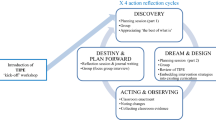Abstract
As the Norwegian society, and thereby the kindergartens, have become more multicultural, the need for cultivating teachers capable of operating in an ever diversified and global world is highlighted as an important educational strategy within teacher education. The purpose of the specific intercultural program in kindergarten teacher education discussed in this article refers to competences needed as a professional teacher in a multicultural kindergarten. Teachers often have various assumptions and beliefs taken for granted. Therefore, reflexivity appears in intercultural education as a crucial asset. However, the article argues that the notion of self-contemplation and self-reflection that can give the subject freedom as a thinking being needs to be challenged. Questioning beliefs and assumptions includes an examination of one’s emotional experiences, values and perspectives. This examination can threaten one’s core beliefs and create powerful feelings such as anger, shame or resentment. Introducing the concept of disorienting dilemmas, the article problematizes the rationalist intellectual orientation in teacher education and discusses the need to focus on intercultural experiences as sensuous, intellectual and affective. The article illustrates some disorienting dilemmas with narratives from students who have attended the program. Finally, the article considers the conditions and pedagogical means that might support a more holistic approach to learning in intercultural experiences.
Similar content being viewed by others
Notes
A 30 ECTS optional program in the third year of the kindergarten teacher education at Western Norway University of Applied Sciences (https://www.hvl.no/studier/studieprogram/emne/kkp1).
References
Biesta, G. J. J. (2010). Good education in an age of measurement : Ethics, politics, democracy. Boulder: Paradigm Publishers.
Birkeland, Å. (2015). Cross cultural comparative education – fortifying preconceptions or transformation of knowledge? Policy Futures in Education, 14(1), 77–91. https://doi.org/10.1177/1478210315612647.
Blasco, M. (2012). On reflection: is reflexivity necessarily beneficial in intercultural education? 1. Intercultural Education, 23(6), 475–489. https://doi.org/10.1080/14675986.2012.736750.
Blosser, A. H., & Kubow, P. K. (2016). Teaching comparative education : trends and issues informing practice (Vol. volume 25, number 2): Symposium Books.
Boler, M. (1999). Feeling power: Emotions and education. Hoboken: Taylor & Francis.
Dewey, J. (1934). Art as experience. New York: Perigee Books.
Dirkx, J. M. (2006). Engaging emotions in adult learning: A Jungian perspective on emotion and transformative learning. New directions for adult and continuing education, 2006(109), 15–26.
Herbers, M. S., & Mullins Nelson, B. (2009). Using the disorienting dilemma to promote transformative learning. Journal on Excellence in College Teaching, 20(1), 5–34.
Hohr, H. (2012). Aesthetic quality in scientific experience – The problem of reference in John Deweys aesthetics. Nordic Studies in Education, 32(03–04), 196–208.
Jokikokko, K. (2016). Reframing Teachers' intercultural learning as an emotional process. Intercultural Education, 27(3), 217–230. https://doi.org/10.1080/14675986.2016.1150648.
Maguth, B. M., & Hilburn, J. (2015). The state of global education: Learning with the world and its people. Routledge.
Mälkki, K. (2010). Building on Mezirow's theory of transformative learning: Theorizing the challenges to reflection. Journal of Transformative Education, 8(1), 42–62. https://doi.org/10.1177/1541344611403315.
Mälkki, K. (2012). Rethinking disorienting dilemmas within real-life crises. Adult Education Quarterly, 62(3), 207–229. https://doi.org/10.1177/0741713611402047.
Mezirow, J. (1991). Transformative dimensions of adult learning. San Fransisco: Jossey-Bass.
Mezirow, J. (2000). Learning as transformation: critical perspectives on a theory in progress. San Fransisco: Jossey-Bass.
Taylor, E. W. (2007). An update of transformative learning theory: A critical review of the empirical research (1999–2005). International Journal of Lifelong Education, 26(2), 173–191. https://doi.org/10.1080/02601370701219475.
Winther-Jensen, T. (2014). Komparativ pædagogik: faglig tradition og global udfordring. København: Akademisk Forlag.
Zembylas, M. (2003). Interrogating “teacher identity”: Emotion, resistance, and self-formation. Educational Theory, 53(1), 107–127. https://doi.org/10.1111/j.1741-5446.2003.00107.x.
Funding
This study was funded by Western Norway University of Applied Sciences.
Author information
Authors and Affiliations
Corresponding author
Ethics declarations
Conflict of Interest
Åsta Birkeland declares that she has no conflict of interest. Siv Ødemotland declares that she has no conflict of interest.
Ethical Approval
All procedures performed in studies involving human participants were in accordance with the ethical standards of the institutional and/or national research committee and with the 1964 Helsinki declaration and its later amendments or comparable ethical standards.
Informed Consent
Informed consent was obtained from all individual participants included in the study.
Additional information
Kindergarten teacher education in Norway is a three-year Bachelor degree qualifying for work in kindergarten. Kindergarten is an early childhood education and care institution for children aged 1-5 years.
Rights and permissions
About this article
Cite this article
Birkeland, Å., Ødemotland, S. Disorienting Dilemmas - the Significance of Resistance and Disturbance in an Intercultural Program within Kindergarten Teacher Education. Integr. psych. behav. 52, 377–387 (2018). https://doi.org/10.1007/s12124-018-9433-y
Published:
Issue Date:
DOI: https://doi.org/10.1007/s12124-018-9433-y




